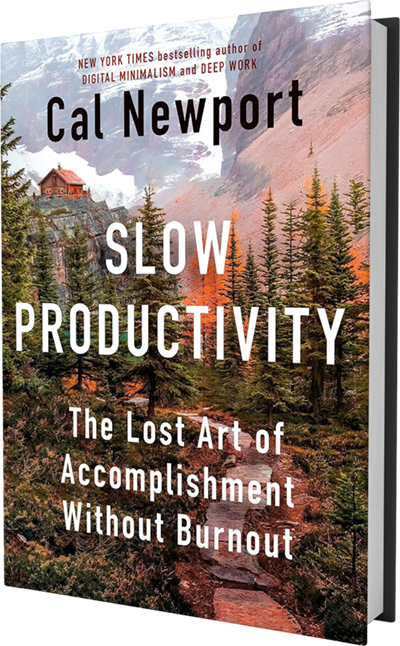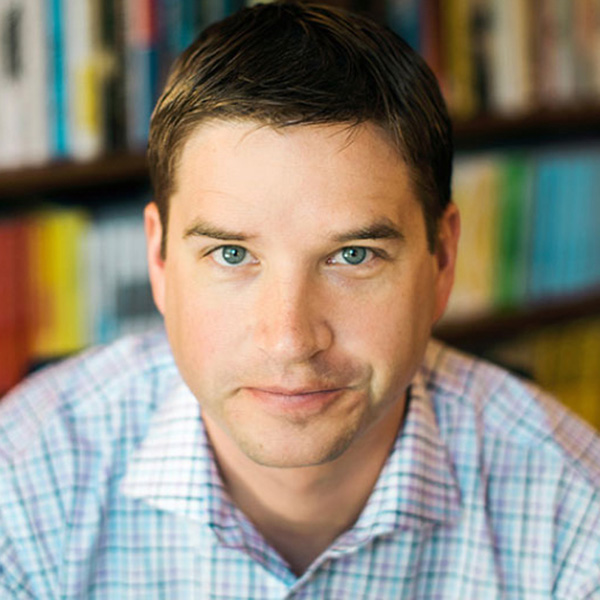Work and caregiving seem to exist as a yin and yang on our lives: the pull of one exerts influence on the other. Yet many of us are required to do both, and while many countries have the documented evidence that creating infrastructure to support caregiving provides economic rewards and increases work opportunities for women, we’re still at a disadvantage in the United States because we lack many of these basic social safety net supports, like federally subsidized child care, paid family leave, even the right to take a sick day.
 Cal Newport, computer scientist and Georgetown University professor, is billed as “one of the world’s top productivity experts.” He also has a new bestselling book, “Slow Productivity,” which extolls the virtues of doing less, working at a more natural pace and obsessing over quality. Doing so can reduce burnout and yield better work, and Newport includes tips along the way to make such work applicable to many different environments, even people who don’t have complete agency over where and how they work. His approaches include adopting a seasonality approach of intense periods followed by rest, limiting the number of ongoing projects at any one time to reduce the amount of administrative overhead, even taking an afternoon off to see a matinee while justifying that the extra time spent checking email on off-hours entitles one to some free time during the workday.
Cal Newport, computer scientist and Georgetown University professor, is billed as “one of the world’s top productivity experts.” He also has a new bestselling book, “Slow Productivity,” which extolls the virtues of doing less, working at a more natural pace and obsessing over quality. Doing so can reduce burnout and yield better work, and Newport includes tips along the way to make such work applicable to many different environments, even people who don’t have complete agency over where and how they work. His approaches include adopting a seasonality approach of intense periods followed by rest, limiting the number of ongoing projects at any one time to reduce the amount of administrative overhead, even taking an afternoon off to see a matinee while justifying that the extra time spent checking email on off-hours entitles one to some free time during the workday.
Newport points to greater thinkers, doers and creative geniuses of the past several hundred years with evidence that their ability to slow down and focus on the nuances of their ideas allowed them to produce lasting, brilliant work, including Jane Austen writing “Pride and Prejudice,” Lin-Manuel Miranda staging Into the Heights, Georgia O’Keefe painting at her summer cottage.
What’s fascinating about Newport’s slow productivity model is that it does seem to work; it’s reminiscent of the state of “flow” that Mihaly Csikszentmihalyi described, and many of us can attest to producing better work when freed of the frenzied pressure and distractions that get in our way. But the slow productivity model regards work as largely the product of the individual – optimizing how to get work done without acknowledging the systematic barriers in place that prevent other people from achieving it. There is little discussion of the role of child care plays, even though we know that a lack of child care is one of the greatest barriers to work and well-being, and has been estimated to cost the economy $122 billion in lost wages. Even remote work, which has helped many parents cope when child care arrangements are lacking, Newport advocates, should be done outside of one’s house. He cites examples of iconic writers and their eccentric workspaces, explaining that this system works better because “the familiar snares our attention, destabilizing the subtle neuronal dance required to think clearly.” Indeed, it does. Yet without child care arrangements, all of this remains off-limits for many.
Early Learning Nation magazine connected with Newport about this and what role he feels caregiving plays in our work. Specifically, how can we still relish in the space of “slow productivity” while still dealing with the un-productive and yet necessary task of raising humans or caring for family members? (Disclosure – Newport and Rebecca Gale both live in the DC-area, where their kids overlap at school). A lightly edited Q and A follows.
Rebecca Gale: A theme I noticed in your book is that so many of these people could experience the coveted slow productivity only when freed of other work and care responsibilities. But the lack of social structures in place—paid family leave, subsidized child care, paid sick days—prevent that for many people. Your book largely focuses on the actions of the individual, but what role do you think those structural supports have in facilitating our current work environment?
Cal Newport: Slow productivity is not a state that you experience (like a flow state) but instead a new approach to thinking about knowledge worker effectiveness. The current status quo in this sector is what I call “pseudo-productivity” which focuses on visible activity as a proxy for useful effort. Pseudo-productivity is particularly difficult for those with care responsibilities as its demands to always be communicating and to always be saying “yes” to requests, provides little schedule flexibility or ability to recharge.
Slow productivity, by contrast, moves the focus away from activity in the moment and toward quality results over time. It acknowledges the need for variation in intensity and prefers doing a small number of things well than a large number of things poorly (and frantically). This is a much more sustainable way of thinking about effectiveness for those with overlapping responsibilities, as it provides more autonomy and freedom to fit work into complicated and varied lives.
In this way, I like to think that in the context of knowledge work, a shift toward slow productivity could complement other more structural solutions, such as paid family leave and subsidized child care, in helping to make these jobs more tolerable. In my book, I give a lot of advice for individuals to begin moving toward this concept of productivity, but longer term, I’d love to see it adopted at the organizational level as well.
Gale: I was a writer long before I was a parent, but once I had my first child, a lot of my workplace-related writing shifted to covering the challenges parents face, particularly how caregiving responsibilities interfere with work-related ones. I know you’re a working parent as well, so how have caregiving responsibilities influenced your own work? Has it changed the way you’ve thought about how to manage time and external distractions? And when you speak to people about the need for slowing down to be more productive, how do you frame caregiving needs in the conversation?
Newport: Caregiving was one of my most important personal motivations for writing this book. I have three boys, and when they all recently reached elementary school age, it became clear that they needed as much “dad time” as I could possibly give them. At the same time, I was reaching the peak of my powers professionally. This led to a clear and urgent question: how can I still produce work I’m proud of while keeping this part of my life contained? Slow productivity was formulated, in large part, as an answer to that question.

Gale: One of the great tenets of your book (which is also reflected in Adelle Waldman’s new novel, Help Wanted) is how people are hard-wired to take pride in their work. In our own work at Better Life Lab, we capture a great deal of narratives from people who continue to work in suboptimal situations because they have pride in what they do. Yet many outdated structures disadvantage people with caregiving needs, such as unpredictable scheduling, zero paid time off and the lack of thoughtful promotion structures that don’t penalize people – usually women – from taking time off. What have you seen that motivates such workplaces to make changes to prioritize such things?
Newport: One of the more insidious side effects of pseudo-productivity is that by centering visible activity as the primary generator of value, it casts any attempts to take time off, or work a reduced or alternative schedule, as a clear loss. By contrast, when you move toward slower definitions of productivity, it becomes more natural to value individuals holistically – not just for the sheer number of hours they can perform visible labor, but for their expertise, their leadership, the rare and valuable projects they will complete during their career. A lot gets better when we stop trying to reduce the value created in complicated and creative knowledge work to the raw hours spent performing busyness.
Gale: You give the suggestion of auto-scheduling tasks, for example, sending invoices on Monday, reviewing grants on Friday, et al. But much of the essence of caregiving is that lack of control as a call from school, a sick kid or a snow day can derail even the best scheduled plans. Even in egalitarian relationships, one parent has to make a shift, and people who parent alone have even less flexibility. How have you found that people can maintain the aspects of slow productivity when outside responsibilities encroach on their well-designed plans?
Newport: A foundational principle of planning-based approaches to organization is that your goal is not to try to stick to your plan perfectly. This rarely happens, as things come up: meetings take longer, kids get sick and so on. The goal instead is to do your best to have intention for when and how you want to get things done. You make the best plan you can. If something comes up, you change it the next time you get a chance, and then follow that new plan. The key is to keep returning to intention. The alternative, which is to go through each day in an ad hoc and reactive fashion, may seem easier at the moment, but is far more stressful and will create much more work for you in the end.
Gale: You’ve documented a lot of historical changes and improvements in the way we work, along with some of the downfalls (days filled with Zoom calls). Where do you see work going, and what do you think things will look like a decade from now? Do you see a situation where the type of slow productivity you advocate will be available to more people in our economy? If so, what do we need to do to get there?
Newport: Slow productivity is a concept that in both its motivation and details is very specific to the knowledge sector. (It wouldn’t make sense, for example, in the industrial sector, or the service sector, which have different structures and incentives.) I definitely hope that something like this more humane approach to productivity becomes wider spread in knowledge work in the years ahead. Even more important, however, is the hope that its opposite—pseudo-productivity —becomes rarer. I concluded my book by saying slow productivity was one of any number of possible alternatives to pseudo-productivity. The key here is less which alternative succeeds than that some alternative succeeds.

Rebecca Gale
Rebecca Gale is a writer with the Better Life Lab at New America where she covers child care. Follow her on Instagram at @rebeccagalewriting, and subscribe to her Substack newsletter, "It Doesn't Have to Be This Hard."


